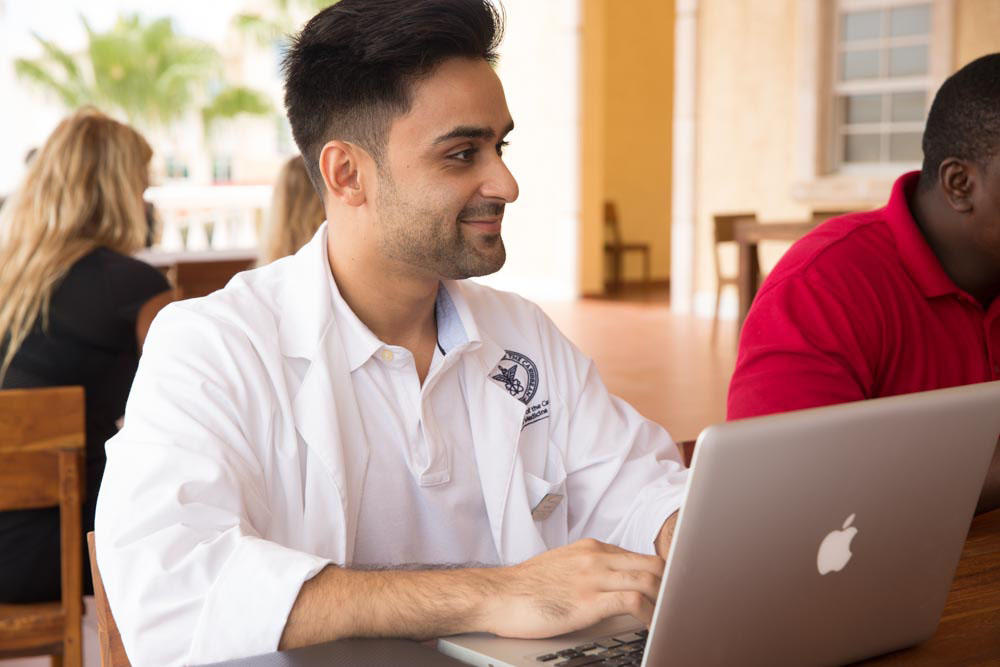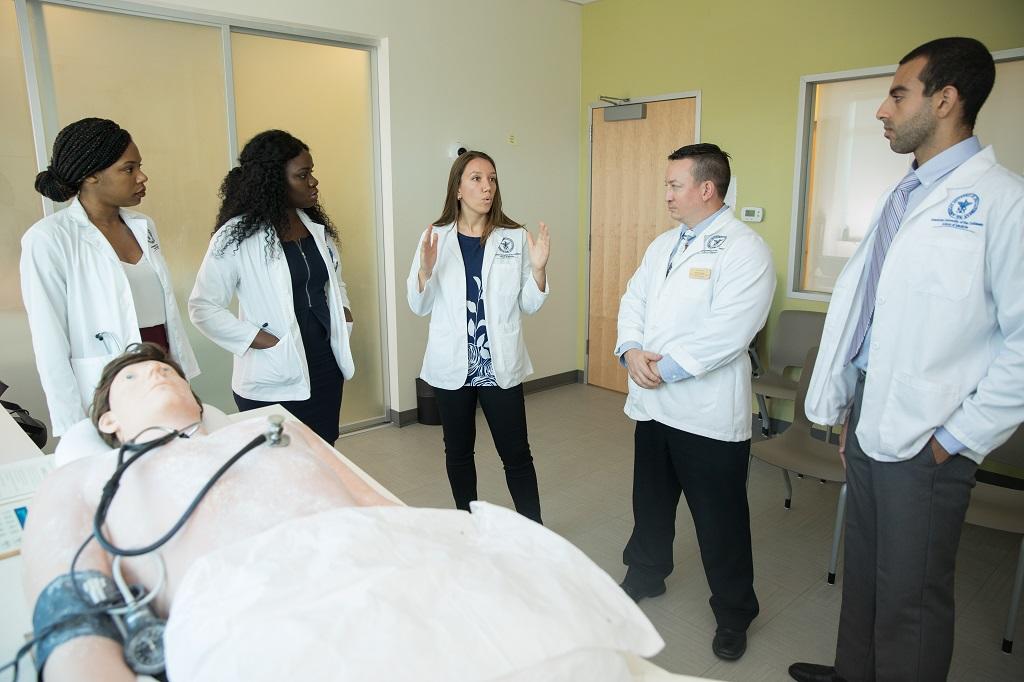Students interested in becoming a physician know that some big hurdles stand in the way—the first of which is medical school. (Internship, residency, and licensing exams can be worried about later). Medical school can be exciting and difficult, but first you have to get in.
And as one might expect, getting into medical school is not easy. There are certain medical school requirements that must be met—prerequisite classes, good grades, an undergraduate degree, medical experience, and a high score on the Medical College Admission Test (MCAT).
But exactly which classes should be taken? What are the necessary medical school prerequisites? How good should grades be—and how high should test scores be? What sort of undergraduate degree works best? The answers to these questions—which can be intimidating—are detailed below.
Students should know what they are up against, but they should also know that it can be done: the latest census by the Federation of State Medical Boards puts the United States licensed physician population at just under 1 million. If you think you can meet the necessary medical school requirements, ask yourself some questions:
- Are you fascinated by human anatomy and the biological sciences?
- Are you an exceptional student willing to put in long hours of studying?
- Can you dedicate four years of undergraduate work to preparing for medical school?
- Do you do well on standardized exams?
- Are you willing to use your free time to gather medical experience?
- Are you really and truly sure you want to be a physician?
If you answered “yes” to one or more of these questions, then medical school may be in your future.
HOW DO I PREPARE FOR MEDICAL SCHOOL?
Excellent high school students should look for a university with a good premed program and do their best to gain entry. “Premed” is not a major, but rather a set of med school prerequisite courses. The pre medical school course requirements typically include the following:
- Biochemistry (one semester)
- Biology (two semesters with a lab)
- English (two semesters)
- General chemistry (two semesters with a lab)
- Math (two semesters)
- Organic chemistry (two semesters with lab)
- Physics (two semesters with a lab)
- Psychology and Statistics are sometimes required
Premed students must take these classes, and they must get good grades in them. Grade point average (GPA) is one of the critical medical school requirements, and a big factor in whether or not you get accepted. Generally speaking, physician hopefuls should have an accumulative GPA of at least 3.5 (on a 4.0 scale). That said, medical schools look at how the mean GPA breaks down between science and non-science classes, and they also look at GPA trends—a late upward trajectory is good.
Medical schools also weigh the reputation of the undergraduate university and the relative difficulty of the applicant’s major. So, depending on circumstances, a student with a GPA below 3.5 may be accepted—especially if the student excels in other aspects of the medical school application evaluation
MEDICAL SCHOOL ADMISSION PREREQUISTES
The cold facts—accumulated by the Association of American Medical Colleges (AAMC)—show that the 53,030 students who applied for medical school in 2020 had a mean GPA of 3.6 and an average science class GPA of 3.49. The 22,239 matriculants (accepted students) carried a mean GPA of 3.73 and a science GPA of 3.66. A quick mental calculation—as premed students should probably be able to do—puts the acceptance rate at 41.9 percent. More than half of applicants, then, fail to get into medical school despite being exceptional students.
Undergraduate students can major in whatever they like if they take the necessary courses that fulfills pre med requirements. Most premed students, however, major in the biological or physical sciences. AAMC data shows that 58 percent of medical school applicants and matriculants in 2020 majored in biological sciences. Physical sciences, the second most common major group, accounted for 9 percent of applicants and 10 percent of matriculants. About 3 percent of medical school applicants and 4 percent of matriculants majored in the humanities—it can be done.
While in university, premed students should sacrifice a good deal of free time to gain medical experience. Medical schools want students to understand the responsibilities and working lives of medical professionals. Students can gain experience by participating in such extracurricular activities as:
- Assisting in faculty medical research projects
- Participating in summer health education programs
- Shadowing a physician
- Working in emergency medical services (EMS)
- Volunteering in health programs
HOW IMPORTANT ARE GPA AND MCAT SCORES?
Premed classes and medical experiences help students prepare for the MCAT, a standardized, multiple-choice exam administered by the AAMC. [Students outside the United States and Canada may take the MCAT, the University Clinical Aptitude Test (UCAT), the National Eligibility cum Entrance Test (NEET), or the Graduate Medical School Admissions Test (GAMSAT).]
The MCAT, generally taken a year prior to applying for medical school, is required for students wanting to enter a four-year medical school—such as the American University of the Caribbean School of Medicine (AUC). Students should take time to study MCAT preparation guides and take MCAT prep courses and MCAT practice tests. High MCAT scores are another crucial med school requirement that is a determining factor in your acceptance to medical school. The test has four sections:
- Biological and Biochemical Foundations of Living Systems (BBLS)
- Chemical and Physical Foundations of Biological Systems (CPBS)
- Psychological, Social, and Biological Foundations of Behavior (PSBB)
- Critical Analysis and Reasoning Skills (CARS)
Each section is scored from a low of 118 to a high of 132, with a midpoint of 125. Scores for the four sections combine for the total score, which ranges from 472 to 528. The midpoint is 500. In 2020, medical school applicants scored an average of 506.4 on the MCAT, and matriculants averaged 511.5.
MCAT scores are less subjective than GPA, but below average scores can still lead to matriculation if the student is above average in other areas of the application. To achieve higher scores, many students take the MCAT more than once—up to three times in one year, four times in two years, or seven times in a lifetime.
With a high GPA, medical experience, and excellent MCAT scores, students must decide which type of medical school they want to attend—schools that offer a traditional Doctor of Medicine (MD) degree, or schools that offer a Doctor of Osteopathy (DO) degree. DO’s and MD’s take the same medical courses, but DO’s also learn osteopathic manipulative treatment (OMT) of the musculoskeletal system as a diagnostic and treatment tool. Most medical schools, including AUC, have MD programs.
WHAT IS THE MED SCHOOL APPLICATION PROCESS?
Students then prepare applications to multiple medical schools, a costly and time-consuming process. The AAMC reports each student applies to an average of 17 medical schools. Applications are done in stages, with primary applications, secondary applications, and interviews all coming before acceptance.
The average acceptance rate of 41.9 percent goes up accordingly with higher med school GPAs and MCAT scores, but the rate shows that more than half of all applicants—no matter how many schools they apply to—are left out in the cold. Students who fail to get into medical school may find something else to do with their lives, but many refuse to give up and reapply to medical school after strengthening their qualifications.
Some universities offer combined baccalaureate-MD programs, which are partnerships between an undergraduate institution and the medical school at the same university or a nearby university. These highly competitive programs can bypass the difficult application process.
For university graduates who want to pause a while or add to their undergraduate education before applying to medical schools, a “gap year” may include working in a medical field or attending a health care master’s program or postbaccalaureate premedical program. A gap year is often more than one calendar year.
Other medical school requirements include letters of recommendation, usually one from a professor and one from a physician or other medical professional. Applicants must also write a personal statement—a concise description of a student’s background and experience that also explains the student’s reason for wanting to become a physician.
Many medical schools also want to see work experience in a resume or Curriculum Vitae (CV). Speaking English is a med school requirement in the United States and Canada, as well as at AUC, where classes are taught in English despite the school’s location on the Dutch side of the Caribbean island of Saint Martin. Non-native English speakers must demonstrate their English proficiency by scoring well on the International English Language Testing System (IELTS) or the Test of English as a Foreign Language (TOEFL). Students must also pay application fees and meet all medical school application deadlines.
READY TO TAKE THE NEXT STEP TOWARD MEDICAL SCHOOL?
The matriculated and determined and talented student then begins the journey through medical school. Keep in mind that this is just the beginning. The four years of medical school, during which students take the first two exams of medical licensure, lead to an MD or a DO degree, but the newly minted physicians are not ready to practice medicine.
A medical residency must follow, during which the doctor takes the third and final exam for medical licensure. For doctors in internal or family medicine, residency is complete after three years and they may go into practice. For doctors in other specialties, residencies continue for an additional one to four years. AUC has a strong history of placing graduating students in internal medicine or specialty residencies. In 2020, 92 percent of 2019-2020 AUC graduates earned residencies throughout the United States and Canada.
The American University of the Caribbean School of Medicine trains tomorrow’s physicians, whose service to their communities and their patients is enhanced by international learning experiences, a diverse learning community, and an emphasis on social accountability and engagement. Take the next step toward medical school: apply for admission to AUC.
Related resources:
- Medical School Requirements
- Should I Go to Medical School?
- Medical School Admission FAQ’s
- MD Program
Sources
https://www.princetonreview.com/med-school-advice/gpa-for-medical-school
https://students-residents.aamc.org/mcat-scores/mcat-exam-score-scale




